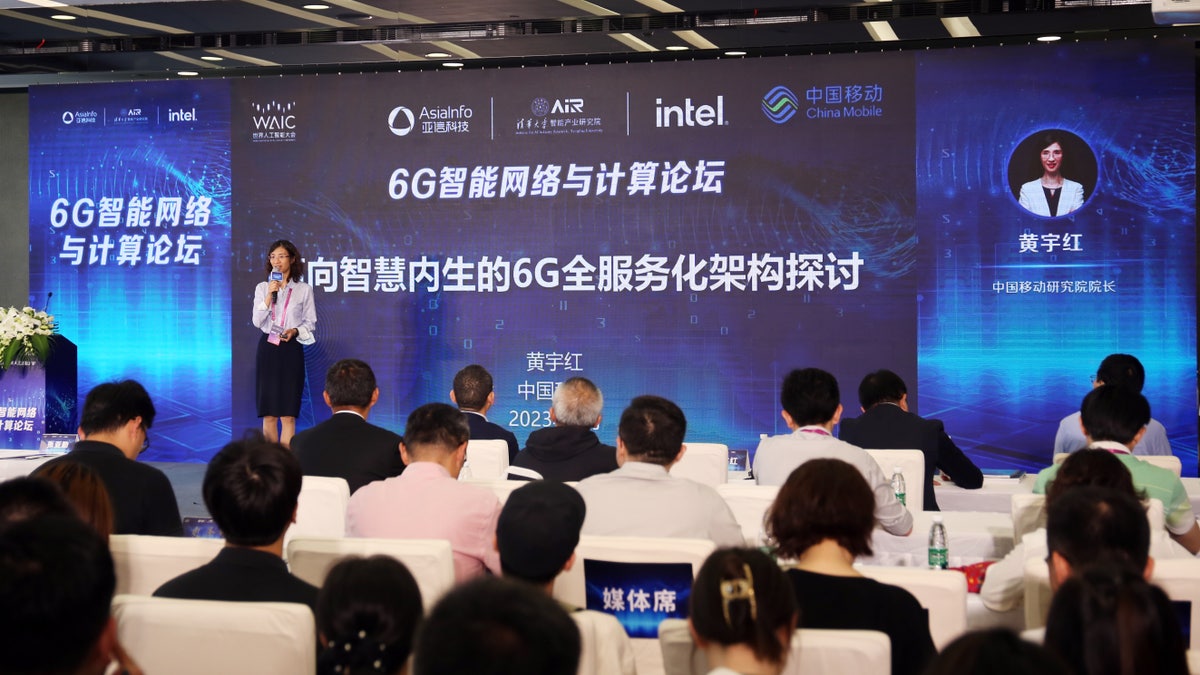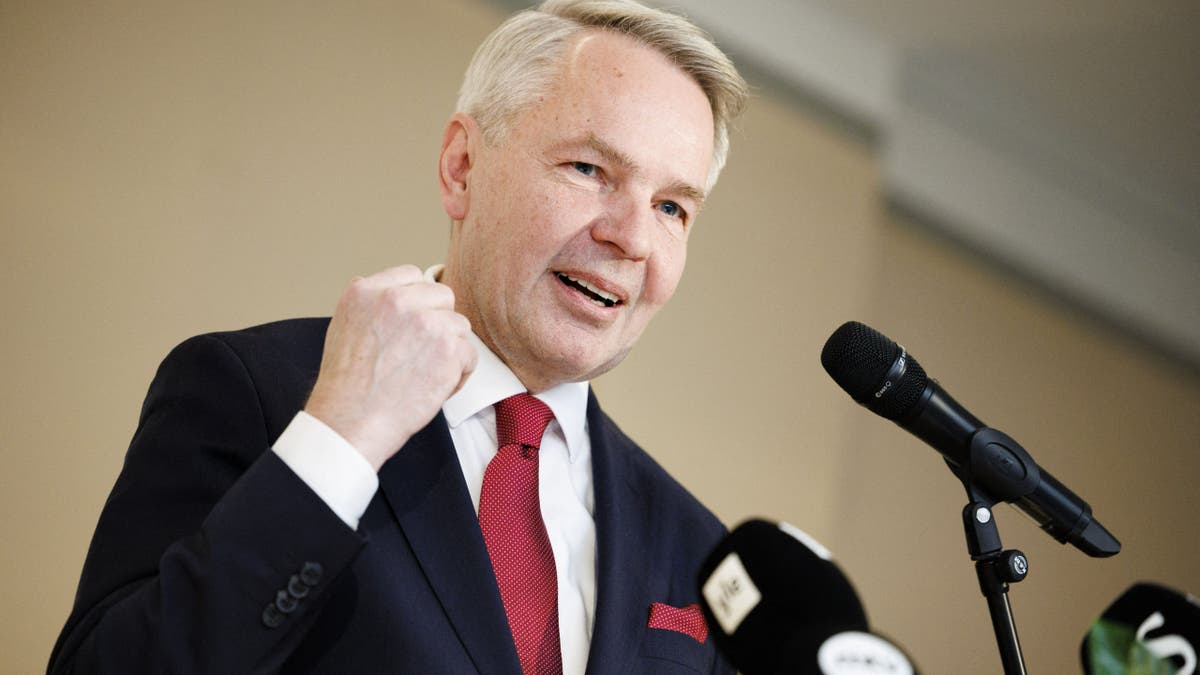Lawmakers, tech experts sound alarm over artificial intelligence's potential dangers
Kara Frederick, tech director at the Heritage Foundation, discusses the need for regulations on artificial intelligence as lawmakers and tech titans discuss the potential risks.
The U.S. and European Union have started exploring how to use artificial intelligence to enhance the oncoming 6G communications technology as Western nations look to stave off competition from China and its own 5G offering.
"Up to now, governments have always had access to communications, certainly, but now it's more about treating telecommunications as a critical national security resource," Eric Plam, president of wireless data connection service SIMO Inc., told Fox News Digital. "I think that's why you're starting to see… an arms race in telecommunications.
"The primary factions are China, and then EU, plus America, too," he added. "There will be other factions, of course, but they understand the importance of controlling information and controlling the flow of data."
The U.S. and EU issued a joint statement in May to declare their intent to continue cooperating on developing a range of technologies, AI and 6G communications.
EXPERTS CALL BIDEN EXECUTIVE ORDER ON AI A ‘FIRST STEP,' BUT SOME EXPRESS DOUBTS
"In this context, we seek to continue advancing the principles presented in the Declaration for the Future of the Internet (DFI), together with like-minded partners," the statement said. "The United States and the European Union share a commitment to develop our workforces with the skills to spur the next wave of economic growth."
That agreement, which manifested in the Smart Networks and Services Joint Undertaking (SNS JU), received a significant boost in October with a pledge of around $137 million (€130 million) from the EU to fund a selection of 27 new research, innovation and trial projects – chiefly, it will "further support and accelerate ground-breaking research in 6G technologies."

The World Artificial Intelligence Conference 6G Intelligent Network and Computing Forum, July 6, 2023, Shanghai, China. (Costfoto/NurPhoto via Getty Images)
"International collaboration is key to achieving a globally accepted 6G standard," the SNS JU announced of the projects. "One project that was selected focuses on EU-US research cooperation."
Those projects include 6G-Cloud, 6G-Twin, Oragami, 6G-Intense and Exigence, among others. The projects variously focus on network architecture and energy consumption problems.
WHAT IS ARTIFICIAL INTELLIGENCE (AI)?
The 6G technology will greatly expand the speed and capacity of data transfer while decreasing the latency considerably – what Plam says will mark a "dramatically" significant improvement in these areas.

Ukrainians use their mobile phones standing near a Starlink satellite-based broadband station in Kherson, on Nov. 13, 2022, amid Russia's invasion of Ukraine. (AFP via Getty Images)
"You start to get to what I think is the goal of modern telecommunications, and that is pervasive connectivity," Plam explained.
"The whole idea [is] that people can be covered wherever they go," he continued. "Part of that puzzle is introducing satellite [wireless], because now you get that air cover that covers the globe, but also the ability for carriers to do a better job-sharing infrastructure, so as a person or an object moves from one place to another they're always connected by some sort of network."

Communication devices are charging in Ukrainian military field camp on Nov. 19, 2022, in Dnipropetrovsk Oblast, Ukraine. (Vitalii Pavlenko/Global Images Ukraine via Getty Images)
Those targets can’t be met without AI enabling the data processing to hit higher thresholds, according to Plam, and it will allow the different markets to achieve the "interoperability" necessary to create a smooth transition.
BUSINESS LEADERS EXPECT AI INVESTMENTS TO PAY OFF, BUT IT MIGHT TAKE TIME: STUDY
"The Chinese are doing that – they're arguably ahead of us," Plam said. "When you think about why the governments are getting involved in this trying to set standards, because it's really more than just the supply chain and the infrastructure that is to come to the table to build networks."

Finnish Foreign Minister Pekka Haavisto speaks during a press conference on June 8, 2023, in Helsinki. (Seppo Samuli/Lehtikuva/AFP via Getty Images)
The U.S. and Finland over the summer signed another Joint Statement that lined up Western 6G as a "free world" response to China’s efforts: Finnish Foreign Minister Pekka Haavisto called 6G "competitive, secure, trustworthy technology" in comparison to China’s tech, according to EurActiv.
"China is an important trading partner both for the U.S. and Finland, but especially after the coronavirus, we witnessed these negative dependencies," Haavisto said.
The push-and-pull around communications technology will have a dramatic effect on information control, according to Plam: Gaining dominance as the pre-eminent communication network could allow someone to determine "who uses network resources or who gets to decide who uses [those] resources," which he warned is not always a good thing.
CLICK HERE TO GET THE FOX NEWS APP
"On one hand, in the West we could say – let's say a network that could block bad actors from accessing the network," he argued. "Of course there's always fraud potential, but once we've created a secure network, then, yes, we could block access to the network collectively, and… you just simply don't want them to use the network to be able to continue playing whatever plays out.
"But on the other hand… what if somebody else gets locked out just because they had the wrong religious or political views? So that's what concerns," he continued. "On one hand, this could lead to greater safety and security for residents and citizens and occupants of the West, [but] on the other hand, it could lead to censorship concerns."









































